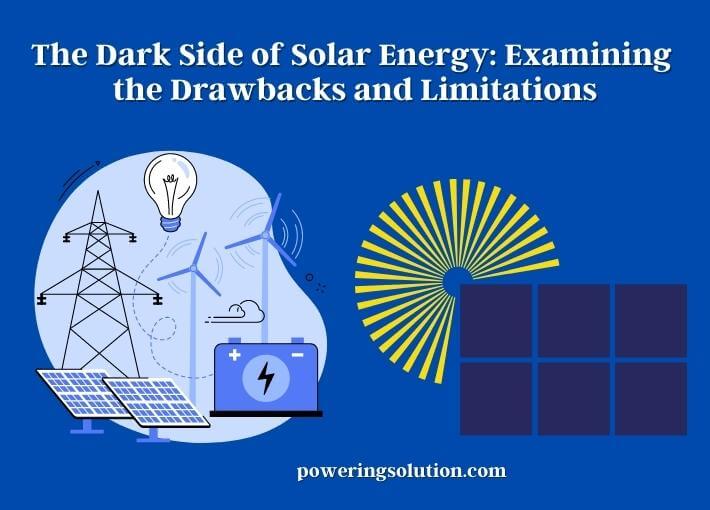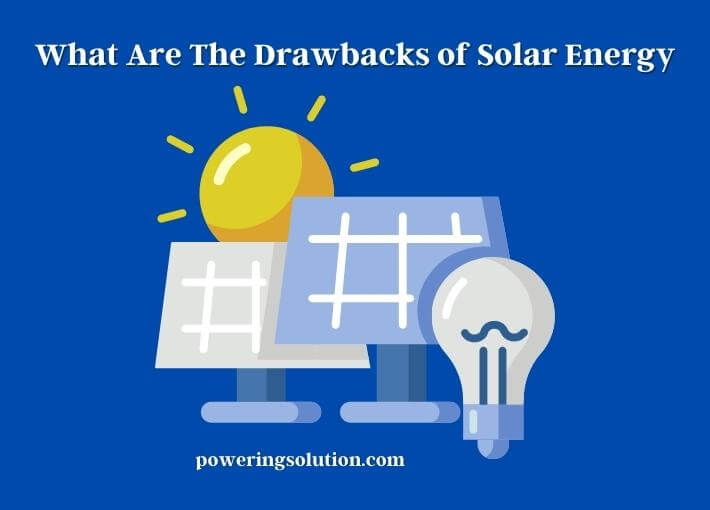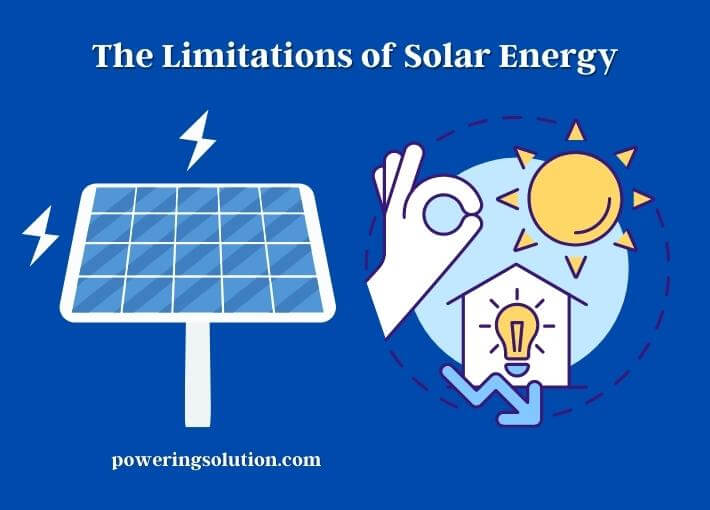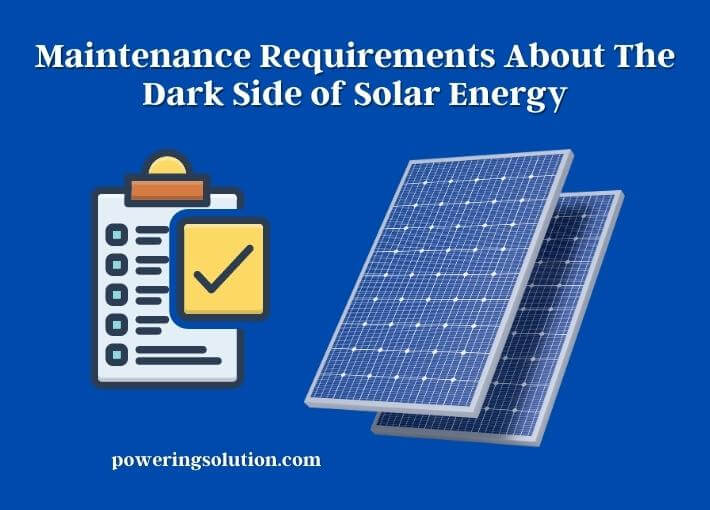Solar energy is often touted as the future of sustainable energy. It is a clean and renewable source of energy that does not produce harmful greenhouse gases or air pollution. It has the potential to reduce our dependence on non-renewable sources of energy and help mitigate climate change. Despite its many benefits, solar energy is not without its drawbacks and limitations.

We will take a closer look at the negative impact it can have on the environment, its high initial cost, and the challenges it faces in terms of efficiency and storage.
What Are The Drawbacks of Solar Energy?
The drawbacks of solar energy include its negative impact on the environment during the manufacturing process, its high initial cost, challenges with efficiency, and limitations in storage capacity.
Solar energy has geographic limitations, as it requires direct sunlight to generate energy, making it less effective in regions with frequent cloud cover or long periods of darkness. Solar panels also require significant land use, which can be a challenge in densely populated areas, and regular maintenance to ensure peak efficiency.
Despite these limitations, solar energy remains a promising source of clean and renewable energy, and technological advancements continue to improve its accessibility and practicality.

Details About The Drawbacks of Solar Energy
Environmental Impact
While solar energy is a clean and renewable source of energy, the manufacturing process for solar panels can have a negative impact on the environment. The production of solar panels requires a significant amount of energy, and the manufacturing process can result in the release of greenhouse gases and other harmful pollutants.
High Initial Cost
One of the biggest drawbacks of solar energy is the high initial cost of installation. While the cost of solar panels has decreased over the years, it is still a significant investment for many homeowners and businesses. The high initial cost can be a barrier for those who want to switch to solar energy.
Efficiency
Another limitation of solar energy is its efficiency. Solar panels are not able to convert all of the sunlight they receive into usable energy. They are also less efficient in cloudy or overcast weather conditions, which can limit their effectiveness in some regions.
Storage
Another limitation of solar energy is storage. Solar energy is only generated during daylight hours, which means that it cannot provide power at night or during cloudy weather. While batteries can be used to store excess energy generated during the day, they are expensive and have limited capacity.
The Limitations of Solar Energy
While solar energy is a clean and renewable source of energy, it has several limitations that make it less practical for some applications. These limitations include:

- High Initial Cost: The cost of installing solar panels can be high, making it less accessible for those who cannot afford the upfront costs. Although the cost of solar panels has decreased in recent years, it remains a significant investment.
- Efficiency Challenges: The efficiency of solar panels can be affected by a variety of factors, such as temperature, shading, and the angle of the sun. This can result in a decrease in energy production, which can affect the overall effectiveness of the system.
- Geographic Limitations: Solar panels require direct sunlight to generate energy, making them less effective in regions with frequent cloud cover or long periods of darkness. This limits the potential use of solar energy in some areas, such as those located in the northern or southern latitudes.
- Land Use Requirements: Solar panels require significant land use, which can be a challenge in densely populated areas where space is limited.
- Regular Maintenance: Solar panels require regular maintenance to ensure peak efficiency. This includes cleaning, inspections, and repairs, which can be time-consuming and costly.
- Storage Limitations: Solar energy can only be generated when the sun is shining, which means it cannot be generated at night or during periods of low sunlight. This requires the use of battery storage systems, which can be expensive and require regular maintenance.
- Environmental Impact: The manufacturing process for solar panels can have a negative impact on the environment. The production of solar panels requires the use of toxic chemicals, such as cadmium and lead, which can be harmful if not properly disposed of.
Despite these limitations, solar energy remains a promising source of clean and renewable energy. With advancements in technology, it is possible that these limitations can be overcome, making solar energy a more practical option for a wider range of applications.
Maintenance Requirements About The Dark Side of Solar Energy
Maintenance requirements are an important consideration when it comes to solar energy systems. Like any other technology, solar panels require regular maintenance to ensure that they perform optimally and last for a long time. Without proper maintenance, solar panels may become less efficient, which can lead to reduced energy production and even system failure.

Regular maintenance includes cleaning the panels to ensure that they are free of dirt, debris, and other obstructions that can reduce their efficiency. In areas with high pollution, such as cities or industrial areas, solar panels may require more frequent cleaning than in other areas.
Inspecting the panels for damage is another important part of maintenance. Solar panels can be damaged by hail, strong winds, or other weather events. Any damage to the panels can reduce their efficiency and may require repairs or replacement.
Checking the system for loose connections, wiring issues, or other potential problems is also a part of regular maintenance. These issues can impact the efficiency and performance of the system and should be addressed as soon as possible to prevent further damage.
In addition to these regular maintenance tasks, solar panels may also require occasional professional maintenance. This can include system checks, repairs, or replacements. It is important to work with a qualified professional who is experienced in solar energy systems to ensure that any maintenance or repairs are done correctly.
Inconsistent Performance
One of the potential drawbacks of solar energy is inconsistent performance. This can be due to a variety of factors, including weather patterns, time of day, and location.
Weather patterns can greatly impact the performance of solar panels. Cloudy or rainy weather can reduce the amount of sunlight that reaches the panels, which in turn reduces their efficiency. In areas with high levels of air pollution, such as cities or industrial areas, the panels may also be affected by smog and other pollutants in the air.
The time of day can also impact the performance of solar panels. Solar panels are most efficient when they are exposed to direct sunlight, which typically occurs during the middle of the day. During early morning or late afternoon hours, the sun is at a lower angle in the sky, which means that the panels are not exposed to direct sunlight and may not perform as well.
Location can also impact the performance of solar panels. Panels located in areas with fewer hours of sunlight or with a lower solar irradiance may not perform as well as panels located in areas with more sunlight.
It is important to note that advances in solar technology have greatly reduced the impact of inconsistent performance. For example, some solar panels now have tracking systems that allow them to follow the sun throughout the day, maximizing their exposure to direct sunlight. Additionally, energy storage solutions such as batteries can help to store excess energy produced during periods of high performance for use during times of low performance.
While inconsistent performance can be a potential drawback of solar energy, advances in technology have greatly reduced its impact. Proper system design, location, and the use of energy storage solutions can help to maximize the performance of solar energy systems and ensure that they provide a reliable source of clean energy for your home or business.
Some Common Questions & Answers
Do Solar Panels Work During Power Outages?
Solar panels alone will not work during a power outage, as they require an inverter to convert the DC energy they produce into AC energy that can be used in your home. Additionally, most solar panel systems are designed to shut down automatically in the event of a power outage to prevent feedback into the electrical grid. If you have a battery backup system, you can continue to generate and use solar energy during a power outage.
You have to know that solar energy and the grid refer to the integration of solar energy into the existing power grid infrastructure.
Can Solar Energy Be Used to Power an Entire Home?
Solar energy can be used to power an entire home, but it depends on several factors, including the size of your solar panel system, the amount of energy your home uses, and the efficiency of your appliances. A solar panel system can be designed to meet the specific energy needs of your home.
Is Solar Energy Really Worth It?
Solar energy can be a worthwhile investment for homeowners and businesses that are able to overcome the high initial cost of installation. It is a clean and renewable source of energy that can help reduce reliance on non-renewable sources of energy.
Last Remarks
While solar energy is a clean and renewable source of energy that has many benefits, there are also drawbacks and limitations to consider. The production of solar panels can have a negative impact on the environment, and the efficiency of solar panels can be affected by factors such as weather and location.
The initial cost of installation can be high, although the long-term savings on electricity bills can make solar panels a cost-effective option. Despite these drawbacks and limitations, solar energy remains a promising alternative to traditional sources of energy and can play a key role in reducing carbon emissions and mitigating climate change.
With continued research and development, solar energy can become an even more viable option for powering our homes and communities.
